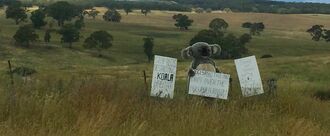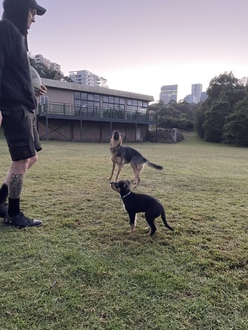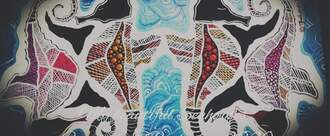-
Ban Nazi SymbolsNazism is based on the idealogy of white supremacy and endorses the ethnic cleansing of non-'Aryan' people a.k.a people who are not white Christians. Nazism is disgusting and dangerous, which is why the Government should do everything in their power to prevent the mimicking of symbols and slogans like the Swastika. In March 2021, a Victorian parliamentary inquiry recommended strengthening the laws against hate symbols. Currently in Germany, Nazi symbols are banned which is an appropriate response to the horrific history of the Holocaust and Nazi rule in the 1930s and 40s. Australia should follow Germany's lead and ban Nazi symbols, especially the Nazi swastika, as these symbols promote the horrendous acts carried out by white supremacists. Please sign this petition to encourage the government to ban Nazi symbols.19 of 100 SignaturesCreated by Caitlyn Boer
-
Accessible Tram Stop at Harp Road, KewAccessible public transport is a rite.3 of 100 SignaturesCreated by Stephen Bailey
-
Safer Level CrossingsTo prevent the unnecessary loss of life1 of 100 SignaturesCreated by Brian Calcutt
-
Protect Aboriginal Heritage and the Belubula River"The Belubula Headwaters Protection Group is a not for profit group established to protect the natural waterways, ecosystems and heritage of the Belubula River Headwaters in Kings Plains, located in the Central West of NSW. The Group is currently opposing a Gold Mine application from Regis Resources Ltd (ASX: RRL). The proposal is to develop an open cut gold mine with a life of just 10 years. The associated Tailings Dam will be 46,700ML, which is over 10,000ML larger than Carcoar Dam which it will destroy if the wall of the Tailings Dam were to breach, leak or collapse. The Mine site is in Wiradjuri Country and will impact on the Belubula River “Bilabula” and its tributaries, this area is rich with artefacts, at least one known burial site, an ochre site and much more, that all evidence the extensive use of the area by the Wiradjuri people. Connection to the river for Wiradjuri people was related to their Kin groups and each person had a responsibility towards care and protection of a section of the river and waterways that related to their family ties. This area also played a role in first contact history with Europeans and forms part of the story of the Bathurst Wars. Destruction of this site will further impact on significant Aboriginal Cultural History that is consistently disregarded in Australia. "To show your support to prevent the destruction of significant Aboriginal and European heritage for a short term project to access a purposeless resource; we strongly encourage you to sign our petition which we will present to the Federal Environment Minister Sussan Ley to encourage them to save the area by approving the section 10 protection order application."306 of 400 SignaturesCreated by Lisa Paton
-
Launch of 150 days of action for people seeking refuge in our landThis year is an opportunity for all of us to celebrate and reflect on Joseph, described by Pope Francis in his apostolic letter, Patris corde (“With a Father’s Heart”), as a beloved father, a father who is creatively courageous, a father in the shadows. Francis names Joseph specifically in his letter as “the special patron of all those forced to leave their native lands because of war, hatred, persecution and poverty.” To honour and acknowledge this, a coalition has come together to initiate 150 days of action across Australia, to engage with people of goodwill, and advocate to change our country’s attitude and policies towards those seeking protection in Australia.1,926 of 2,000 SignaturesCreated by Joelle Sassine
-
Implement FOGO to reduce council fees & greenhouse gasesImplementing FOGO will help council rates stay as low as possible. In addition it will deliver environmental benefits as methane gas (a significant contributor to climate change) is released when food scraps are included with general rubbish. This project is a win-win....a win for your hip pocket as well as the environment. Tell Mayor Khal Asfour that you want FOGO implemented in Canterbury Bankstown Council37 of 100 SignaturesCreated by Elissa Micallef
-
Catherine King join the Bring Julian Assange Home Parliamentary GroupBoth the implications of Assange's case for democracy and the fact that his treatment has been classified as torture make this an issue of utmost importance. Assange's situation has been described by the UN Special Rapporteur on Torture Nils Melzer as "a huge scandal and represents the failure of Western rule of law. If Julian Assange is convicted, it will be a death sentence for freedom of the press." Melzer also "visited Assange in his cell in London in May 2019 together with two experienced, widely respected doctors who are specialized in the forensic and psychological examination of torture victims. The diagnosis arrived at by the two doctors was clear: Julian Assange displays the typical symptoms of psychological torture. If he doesn’t receive protection soon, a rapid deterioration of his health is likely, and death could be one outcome." Image: Metahaven, "Leaked" WikiLeaks posters, 201030 of 100 SignaturesCreated by Eve Blayney
-
Waverton Dog Park Night LightsThis dog park is used by many people and canines every afternoon, most of whom all know each other and are good friends with each other and come down together for the enjoyment of socialisation with each other and exercise. This is even more precious to some during the current pandemic as its the only face to face contact they get all day. However due to the winter sun and day light savings by the time we get down there its pitch black which presents alot of safety issues for ourselves, passers by, cars and of course the pooches. Its safe to say the park is used by many at this time of night. The difference in the amount of dog owners that are down in summer arvos and winter arvos is very noticeable. Many people arent willing to risk it or deal with the anxiety of not being able to see the dogs and as such forfeit the experience which is harmful to the human and pooches socialisation and exercise. Also anyone walking through to balls head or to the lower park for sport cant see whats going on which can be scary and dangerous.58 of 100 SignaturesCreated by Alastair Noble
-
The Gumma IPA Ranger WorkThis is important bush regeneration work for our Gumbaynggirr homelands for future generations maintaining & sustaining cultural connections. Our future is in the land.35 of 100 SignaturesCreated by Tamikar Buchanan
-
Confine Domestic Cats in New South WalesCurrently in New South Wales, your neighbor's cat can come onto your property and even into your house at any time of the day or night; defecate in your flower garden, vegetable patch or child’s sand box; spray your plants and walls, and scare and kill the native wildlife in your garden. To an ordinary person, any cat doing any of these things would be deemed a “nuisance.” But NSW has a much narrower legal definition of a nuisance cat. NSW law considers a cat a “nuisance” only if it “makes a noise that persistently occurs or continues to such a degree or extent that it unreasonably interferes with the peace, comfort or convenience of any person in any other premises, or “repeatedly damages anything outside the property on which it is ordinarily kept” (Companion Animals Act 1998, Sec. 31) (emphasis added). The burden of proof is on you. Only if you can prove one of these highly subjective offences, can your local council make a “nuisance cat” declaration and act. But it is highly unlikely an ordinary citizen could prove either of these two definitions of a nuisance cat to a court’s satisfaction. In all cases, the offences would be fleeting and/or occur at night. Complainants would have to have audio or photographic evidence. Audio evidence, most likely available only at night, would have to be certified as to time and place, and be precise as to identify the cat. Photographic evidence would have to be unequivocal as to location (the complainant’s property). These problems make it almost impossible to provide the evidence necessary to meet the current definition of a nuisance cat. “Prove it was my cat!” “Prove it was on your property!” In effect, therefore, offended owners have no practical recourse to stop a cat coming onto their property and doing whatever it likes. The current law is ineffective, and ineffective law is bad law. There are two reasons why there is no effective control of roaming cats. First, it is thought to be cruel or “unnatural.” Second, it is an unreasonable inconvenience to cat owners. As to cruelty, the RSPCA recommends that Australia move to 24 hour-containment of domestic cats (https://kb.rspca.org.au/wp-content/uploads/2019/01/Identifying-Best-Practice-Domestic-Cat-Management-in-Australia-RSPCA-Research-Report-May-2018.pdf). Further, when a well-fed domestic cat kills wildlife, arguably, its owner perpetrates a preventable and unnecessary act of animal cruelty through the agency of their cat. Research suggests that pet cats in Australia kill up to 230 million native animals per year. As to confinement being an inconvenience to a cat’s owner, this is no greater than the frustration and anger at the loss of amenity for the neighbouring householders who like their gardens and love their wildlife and are told they just have to “live with it.” And one cat can impact many properties. Radio-tracking shows that domestic cats routinely roam across three or four neighbouring yards, with occasional forays two or three times this distance and into adjacent bushland. Twenty-seven percent of Australia households have cats, and 14 percent of households let their cats roam. Why should the 86 percent of non-cat and responsible-cat households have to pander to this “don’t-care” minority? There are three ways cats can be kept from roaming: keep them indoors; put them on a tether when outdoors, or keep them in a cat run. All these restraints are sanctioned by animal welfare legislation, and responsible owners already use them. Indeed, many cats are kept indoors their entire lives. No other domestic animal is allowed to roam freely through our neighborhoods, so why should domestic cats?8,381 of 9,000 SignaturesCreated by Allen Greer
-
Support the building of State Quarantine Hubs in AustraliaThe federal government needs to protect people and the economy. Hotel quarantine has proven flaws. We need quarantine hubs built with access to airports and hospitals. These hubs should be built based on the advice of scientists and what best prevents the spread of infectious diseases. We need our Federal Government to take action NOW!69 of 100 SignaturesCreated by Mary Anderson
-
Save Marney’s Hill Wildlife Nature ReserveThe reserve is valuable habitat for flora and fauna, including endangered species such as Masked Owl (only 350 breeding pairs left); Wedge-Tailed Eagle (less than 900 remain in Tassie); Tassie Devils (85% losses); Green and Gold Frog (20% drop in numbers; many other native birds; Echidna; Bandicoots; and Wombats (soft release). Destroying this habitat to build a prison, when there are alternative prison sites with low natural values should be unconscionable.16 of 100 SignaturesCreated by Peter Mackenzie











